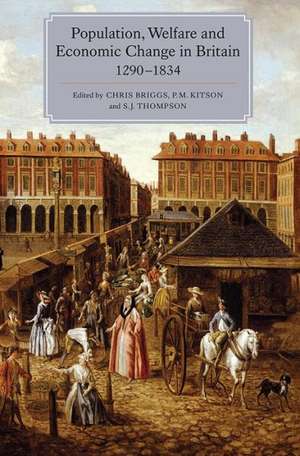Population, Welfare and Economic Change in Britain, 1290–1834: People, Markets, Goods: Economies and Societies in History
Autor Chris Briggs, P.m. Kitson, S.j. Thompson, P. M. Kitson, S. J. Thompsonen Limba Engleză Paperback – 17 dec 2014
A further distinctive feature of this book is its comparative perspective. By making systematic comparisons between economic and demographic developments in pre-industrial Britain and those taking place in various regions of contemporary Continental Europe and Russia, several chapters uncover how far Britain in this period was 'different'. Stimulating to experts and students alike, Population, Welfareand Economic Change offers overviews and summaries of the latest scholarship by leading economic historians and historical demographers, alongside detailed case studies which showcase the original research of younger scholars.
Chris Briggs is Lecturer in Medieval British Economic and Social History at the University of Cambridge and a Fellow of Selwyn College. P.M. Kitson is a former Research Associate at the Cambridge Group for the Historyof Population and Social Structure and Bye-Fellow of Downing College, Cambridge. S.J. Thompson is a former J.H. Plumb Fellow and Director of Studies in History at Christ's College, Cambridge.
CONTRIBUTORS: Lorraine Barry, Jeremy Boulton, Chris Briggs, Bruce M.S. Campbell, Tracy Dennison, Nigel Goose, R.W. Hoyle, Peter Kitson, Julie Marfany, Rebecca Oakes, Sheilagh Ogilvie, Stephen Thompson, Samantha Williams, Sir Tony Wrigley, Margaret Yates
Din seria People, Markets, Goods: Economies and Societies in History
-
 Preț: 179.92 lei
Preț: 179.92 lei -
 Preț: 233.72 lei
Preț: 233.72 lei -
 Preț: 180.81 lei
Preț: 180.81 lei -
 Preț: 246.72 lei
Preț: 246.72 lei -
 Preț: 244.49 lei
Preț: 244.49 lei -
 Preț: 241.00 lei
Preț: 241.00 lei -
 Preț: 246.72 lei
Preț: 246.72 lei -
 Preț: 246.72 lei
Preț: 246.72 lei -
 Preț: 237.90 lei
Preț: 237.90 lei -
 Preț: 180.53 lei
Preț: 180.53 lei -
 Preț: 180.59 lei
Preț: 180.59 lei -
 Preț: 234.59 lei
Preț: 234.59 lei -
 Preț: 243.43 lei
Preț: 243.43 lei -
 Preț: 181.25 lei
Preț: 181.25 lei -
 Preț: 237.90 lei
Preț: 237.90 lei -
 Preț: 241.00 lei
Preț: 241.00 lei -
 Preț: 235.71 lei
Preț: 235.71 lei -
 Preț: 181.08 lei
Preț: 181.08 lei -
 Preț: 181.03 lei
Preț: 181.03 lei -
 Preț: 183.08 lei
Preț: 183.08 lei -
 Preț: 179.16 lei
Preț: 179.16 lei -
 Preț: 194.46 lei
Preț: 194.46 lei
Preț: 242.74 lei
Nou
Puncte Express: 364
Preț estimativ în valută:
46.45€ • 48.63$ • 38.43£
46.45€ • 48.63$ • 38.43£
Carte disponibilă
Livrare economică 17-31 martie
Preluare comenzi: 021 569.72.76
Specificații
ISBN-13: 9781843839552
ISBN-10: 1843839555
Pagini: 362
Dimensiuni: 156 x 234 x 20 mm
Greutate: 0.51 kg
Editura: BOYDELL PRESS
Seria People, Markets, Goods: Economies and Societies in History
ISBN-10: 1843839555
Pagini: 362
Dimensiuni: 156 x 234 x 20 mm
Greutate: 0.51 kg
Editura: BOYDELL PRESS
Seria People, Markets, Goods: Economies and Societies in History
Notă biografică
Chris Briggs, P.M. Kitson, S.J. Thompson
Cuprins
Introduction - Chris Briggs and P. M. Kitson and S. J. Thompson European Marriage Patterns and their Implications: John Hajnal's Essay and Historical Demography During the Last Half-Century - E.A. Wrigley The Population Geography of Great Britain c.1290: a Provisional Reconstruction - Bruce M.S. Campbell and Lorraine Barry Mobility and Mortality: How Place of Origin Affected the Life Chances of Late Medieval Scholars at Winchester College and New College Oxford - Rebecca Oakes Family and Welfare in Early Modern Europe: a North-South Comparison - Julie Marfany Support for the Elderly during the 'Crisis' of the English Old Poor Law - Samantha Williams Indoors or Outdoors? Welfare Priorities and Pauper Choices in the Metropolis under the Old Poor Law, 1718-1824 - Jeremy Boulton Population Growth and Corporations of the Poor, 1660-1841 - S. J. Thompson Charity and Commemoration: a Berkshire Family and their Almshouse 1675-1763 - Nigel Goose and Margaret Yates The Institutional Context of Serfdom in England and Russia - Tracy Dennison Choices and Constraints in the Pre-Industrial Countryside - Sheilagh Ogilvie Some Commercial Implications of English Individualism - Richard Hoyle Select Bibliography
Descriere
Presents the latest research on the causes and consequences of British population change from the medieval period to the eve of the Industrial Revolution, in both town and countryside
